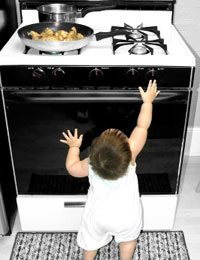Keeping Babies Safe at Home
Many new parents worry about the dangers their little ones will face outside of the home; however, some of the greatest threats are lurking in the nursery, the kitchen and the bathroom within their homes. In fact, children between the ages of one and four are more likely to get injured by fire, burns, choking, poisoning or falling at home than by violence from a stranger.
To keep your little one safe as they grow, implement these safety precautions in your home:
Baby Safety Recommendations
Choking Prevention
- Put babies to sleep on their backs and keep toys, pillows and excess blankets out of the crib.
- Do not hang ribbons, strings or any items that can be grabbed over a crib.
- Do not give children toys that are not age-appropriate by always reading the manufacturer’s packaging to make sure that it is suitable for their age and ability level.
- Cut the loops of window blind cords into two pieces and place them out of your baby’s reach.
- Monitor your baby while they are eating, drinking or teething. Make sure he/she is upright and not crying when feeding solid foods.
- Mash or grind foods so they are soft enough to gum and swallow.
- Do not feed children peanut butter, popcorn, raw carrots, nuts, grapes or uncooked peas before age three because children often do not chew food before they swallow it.
Fall Prevention:
- Use safety gates at the base and top of staircases.
- Secure children with straps in high chairs, changing tables and strollers.
Poisoning:
- Remove medicines and medical supplies from easily accessible places around the house. Place these items out of your baby’s reach.
- Place cleaning products, alcohol and other poisons in a cabinet with a child safety lock.
- Identify household items that may be toxic to young children. (ex: Iron pills are the leading killer of children under age six).
Water Hazards:
- Place locks on your toilet lids and bathroom doors.
- Do not leave standing water in buckets for your child to access. Small children can drown in as little as two inches of liquid if they fall in.
- Set your water heater to less than 120°F to prevent accidental scalding, and use a water thermometer to test bath water before placing your child in the tub.
Keep your little ones safe every day of their young lives by keeping a close eye on them. For more information regarding baby safety, contact your pediatrician. For more information regarding home insurance, contact your agent.



